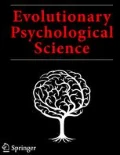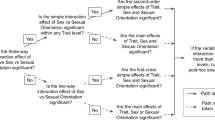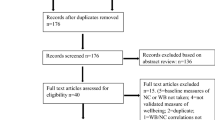Abstract
In the present study, we tested the hypothesis that psychopathy emerges as an adaptive behavioral response to a harsh environment: psychopathy could represent a mediator in the link between a harsh environment and fast life history pathway. We measured environmental harshness, psychopathy (boldness, meanness, and disinhibition), and a wide range of life history parameters (expected longevity, covitality, age at first menstruation, age at first sex, mating success, planned age at first reproduction, and expected total fertility) in a sample of young female adults (N = 196). Factor analysis of the life history indicators produced three- and two-factor solutions and we decided to analyze the latter one—extracted components are described as long-term mating and expected future fitness. Environmental harshness was positively related to psychopathy and negatively to expected future fitness. Path analysis revealed that the disinhibition trait mediates the link between the environment and expected future fitness. Analysis also showed adaptive differences between boldness and disinhibition: while both psychopathy traits were negatively associated to long-term mating, boldness was positively related to expected future fitness, in contrast to disinhibition which showed negative associations with this life history measure. Hence, boldness showed the highest adaptive potential. Study results are in line with life history theory in humans and show the heuristic power of applying behavioral ecological framework to the study of psychopathy.

Similar content being viewed by others
Notes
It is noteworthy to mention that the role of father absence during the childhood, as one of the major environmental triggers of fast life-history trajectory, is recently challenged. There is data suggesting that the relation between father absence and earlier menarche (as an indicator of fast life-history pathway) may be genetic in its nature (Barbaro et al. 2017) or that it may actually be attributed to lower investment in half or step-siblings (Smith 2017).
References
Babiak, P., & Hare, R. D. (2006). Snakes in suits: When psychopaths go to work. New York: Regan Books.
Barbaro, N., Boutwell, B. B., Barnes, J. C., & Shackelford, T. K. (2017). Genetic confounding of the relationship between father absence and age at menarche. Evolution and Human Behavior, 38, 357–365. https://doi.org/10.1016/j.evolhumbehav.2016.11.007.
Belsky, J. (2012). The development of human reproductive strategies: Progress and prospects. Current Directions in Psychological Science, 21, 310–316. https://doi.org/10.1177/0963721412453588.
Belsky, J., Steinberg, L., & Draper, P. (1991). Childhood experience, interpersonal development, and reproductive strategy: An evolutionary theory of socialization. Child Development, 62, 647–670. https://doi.org/10.2307/1131166.
Belsky, J., Steinberg, L., Houts, R. M., Halpern-Felsher, B. L., & the NICHD Early Child Care Research Network. (2010). The development of reproductive strategy in females: Early maternal harshness→ earlier menarche→ increased sexual risk taking. Developmental Psychology, 46, 120–128. https://doi.org/10.1037/a0015549.
Bielby, J., Mace, G. M., Bininda-Emonds, O. R. P., Cardillo, M., Gittleman, J. L., Jones, K. E., Orme, C. D. L., & Purvis, A. (2007). The fast-slow continuum in mammalian life history: An empirical reevaluation. American Naturalist, 169, 748–757. https://doi.org/10.1086/516847.
Biro, P. A., & Stamps, J. A. (2008). Are animal personality traits linked to life-history productivity? Trends in Ecology & Evolution, 23, 361–368. https://doi.org/10.1016/j.tree.2008.04.003.
Blom, G. (1958). Statistical estimates and transformed beta-variables. NY: Wiley.
Book, A. S., & Quinsey, V. L. (2004). Psychopaths: Cheaters or warrior-hawks? Personality and Individual Differences, 36, 33–45. https://doi.org/10.1016/S0191-8869(03)00049-7.
Bulled, N. L., & Sosis, R. (2010). Examining the relationship between life expectancy, reproduction, and educational attainment. Human Nature, 21, 269–289. https://doi.org/10.1007/s12110-010-9092-2.
Cale, E. M., & Lilienfeld, S. O. (2002). Sex differences in psychopathy and antisocial personality disorder: A review and integration. Clinical Psychology Review, 22, 1179–1207. https://doi.org/10.1016/S0272-7358(01)00125-8.
Chisholm, J. S., Quinlivan, J. A., Petersen, R. W., & Coall, D. A. (2005). Early stress predicts age at menarche and first birth, adult attachment, and expected lifespan. Human Nature, 16, 233–265. https://doi.org/10.1007/s12110-005-1009-0.
Cunha, O., Braga, T., & Gonçalves, R. A. (2018). Psychopathy and intimate partner violence. Journal of Interpersonal Violence, advance online publication. https://doi.org/10.1177/0886260518754870.
Del Giudice, M., Gangestad, S. W., & Kaplan, H. S. (2015). Life history theory and evolutionary psychology. In D. M. Buss (Ed.), The handbook of evolutionary psychology—Vol. 1: Foundations (2nd ed., pp. 88–114). New York: Wiley.
Dolan, M. C., & Fullam, R. S. (2010). Moral/conventional transgression distinction and psychopathy in conduct disordered adolescent offenders. Personality and Individual Differences, 49, 995–1000. https://doi.org/10.1016/j.paid.2010.08.011.
Figueredo, A. J. (2007). The Arizona Life History Battery [Electronic Version]. http://www.u.arizona.edu/~ajf/alhb.html.
Figueredo, A. J., Vásquez, G., Brumbach, B. H., Sefcek, J. A., Kirsner, B. R., & Jacobs, W. J. (2005). The K-factor: Individual differences in life history strategy. Personality and Individual Differences, 39, 1349–1360. https://doi.org/10.1016/j.paid.2005.06.009.
Figueredo, A. J., Vásquez, G., Brumbach, B. H., Schneider, S. M., Sefcek, J. A., Tal, I. R., et al. (2006). Consilience and life history theory: From genes to brain to reproductive strategy. Developmental Review, 26, 243–275. https://doi.org/10.1016/j.dr.2006.02.002.
Giosan, C. (2006). High-K strategy scale: A measure of the high-K independent criterion of fitness. Evolutionary Psychology, 4, 394–405. https://doi.org/10.1177/147470490600400131.
Glenn, A. L., Kurzban, R., & Raine, A. (2011). Evolutionary theory and psychopathy. Aggression and Violent Behavior, 16, 371–380. https://doi.org/10.1016/j.avb.2011.03.009.
Helle, S. (2008). A tradeoff between reproduction and growth in contemporary Finnish women. Evolution and Human Behavior, 29, 189–195. https://doi.org/10.1016/j.evolhumbehav.2007.11.009.
Hunt, J., & Hodgson, D. (2010). What is fitness, and how do we measure it? In D. Westneat & C. Fox (Eds.), Evolutionary behavioral ecology (pp. 46–70). New York: Oxford University Press.
Jonason, P. K., Koenig, B. L., & Tost, J. (2010a). Living a fast life: The dark triad and life history theory. Human Nature, 21, 428–442. https://doi.org/10.1007/s12110-010-9102-4.
Jonason, P. K., Li, N. P., & Buss, D. M. (2010b). The costs and benefits of the dark triad: Implications for mate poaching and mate retention tactics. Personality and Individual Differences, 48, 373–378. https://doi.org/10.1016/j.paid.2009.11.003.
Jonason, P. K., Luevano, V. X., & Adams, H. M. (2012). How the dark triad traits predict relationship choices. Personality and Individual Differences, 53, 180–184. https://doi.org/10.1016/j.paid.2012.03.007.
Kimonis, E. R., Fanti, K. A., Isoma, Z., & Donoghue, K. (2013). Maltreatment profiles among incarcerated boys with callous-unemotional traits. Child Maltreatment, 18, 108–121. https://doi.org/10.1177/1077559513483002.
Knežević, G. (2003). Koreni amoralnosti [the roots of amorality]. Beograd: Institut za kriminološka i sociološka istraživanja, Institut za psihologiju.
Krupp, D. B., Sewall, L. A., Lalumière, M. L., Sheriff, C., & Harris, G. T. (2012). Nepotistic patterns of violent psychopathy: Evidence for adaptation? Frontiers in Psychology, 3, 1–8. https://doi.org/10.3389/fpsyg.2012.00305.
Leistico, A. M. R., Salekin, R. T., DeCoster, J., & Rogers, R. (2008). A large-scale meta-analysis relating the hare measures of psychopathy to antisocial conduct. Law and Human Behavior, 32, 28–45. https://doi.org/10.1007/s10979-007-9096-6.
Lynam, D. R., Loeber, R., & Stouthamer-Loeber, M. (2008). The stability of psychopathy from adolescence into adulthood: The search for moderators. Criminal Justice and Behavior, 35, 228–243. https://doi.org/10.1177/0093854807310153.
McDonald, M. M., Donnellan, M. B., & Navarrete, C. D. (2012). A life history approach to understanding the dark triad. Personality and Individual Differences, 52, 601–605. https://doi.org/10.1016/j.paid.2011.12.003.
Mealey, L. (1995). The sociobiology of sociopathy: An integrated evolutionary model. Behavioral and Brain Sciences, 18, 523–541. https://doi.org/10.1017/S0140525X00039595.
Međedović, J. (2015). Nomološka mreža psihopatije [Nomological network of psychopathy]. Beograd: Institut za kriminološka i sociološka istraživanja.
Međedović, J. (2016). Can family risk-factors moderate the link between psychopathy and life-history strategy? Psihološka istraživanja, 19(1), 23–34.
Međedović, J. (2018). Testing the state-dependent behavior models in humans: Environmental harshness moderates the link between personality and mating. Personality and Individual Differences, 125, 68–73. https://doi.org/10.1016/j.paid.2017.12.035.
Međedović, J. (in press). What can human personality psychology learn from behavioral ecology? Journal of Comparative Psychology. https://doi.org/10.1037/com0000120.
Međedović, J. & Damjanović, A. (2018). Measuring psychopathy via small sample of TriPM items. Zbornik Instituta za kriminološka i sociološka istraživanja, 37(1), 7–22.
Međedović, J., Petrović, B., Želeskov-Đorić, J., & Savić, M. (2017). Interpersonal and affective psychopathy traits can enhance human fitness. Evolutionary Psychological Science, 3, 306–315. https://doi.org/10.1007/s40806-017-0097-5.
Meij, J. J., Van Bodegom, D., Ziem, J. B., Amankwa, J., Polderman, A. M., Kirkwood, T. B. L., et al. (2009). Quality–quantity trade-off of human offspring under adverse environmental conditions. Journal of Evolutionary Biology, 22, 1014–1023. https://doi.org/10.1111/j.1420-9101.2009.01713.x.
Neel, R., Kenrick, D. T., White, A. E., & Neuberg, S. L. (2016). Individual differences in fundamental social motives. Journal of Personality and Social Psychology, 110, 887–907. https://doi.org/10.1037/pspp0000068.
Nettle, D. (2011). Flexibility in reproductive timing in human females: Integrating ultimate and proximate explanations. Philosophical Transactions of the Royal Society of London B: Biological Sciences, 366, 357–365. https://doi.org/10.1098/rstb.2010.0073.
Nettle, D., Coall, D. A., & Dickins, T. E. (2010). Birthweight and paternal involvement predict early reproduction in British women: Evidence from the national child development study. American Journal of Human Biology, 22, 172–179. https://doi.org/10.1002/ajhb.20970.
Nettle, D., Frankenhuis, W. E., & Rickard, I. J. (2013). The evolution of predictive adaptive responses in human life history. Proceedings of the Royal Society B: Biological Sciences, 280, 20131343. https://doi.org/10.1098/rspb.2013.1343.
Patch, E. A., & Figueredo, A. J. (2017). Childhood stress, life history, psychopathy, and sociosexuality. Personality and Individual Differences, 115, 108–113. https://doi.org/10.1016/j.paid.2016.04.023.
Patrick, C. J., Fowles, D. C., & Krueger, R. F. (2009). Triarchic conceptualization of psychopathy: Developmental origins of disinhibition, boldness, and meanness. Development and Psychopathology, 21, 913–938. https://doi.org/10.1017/S0954579409000492.
Penke, L. (2013). Revised sociosexual orientation inventory. In T. D. Fisher, C. M. Davis, W. L. Yarber, & S. L. Davis (Eds.), Handbook of sexuality-related measures (3rd ed., pp. 622–625). New York: Routledge.
Pianka, E. R. (1970). On r-and K-selection. The American Naturalist, 104(940), 592–597.
Smith, D. (2017). O brother, where art thou? Investment in siblings for inclusive fitness benefits, not father absence, predicts earlier age at menarche. Biology Letters, 13, 20170464. https://doi.org/10.1098/rsbl.2017.0464.
Taylor, S. E., Lerner, J. S., Sage, R. M., Lehman, B. J., & Seeman, T. E. (2004). Early environment, emotions, responses to stress, and health. Journal of Personality, 72, 1365–1394. https://doi.org/10.1111/j.1467-6494.2004.00300.x.
Viding, E., Simmonds, E., Petrides, K. V., & Frederickson, N. (2009). The contribution of callous-unemotional traits and conduct problems to bullying in early adolescence. Journal of Child Psychology and Psychiatry, 50, 471–481. https://doi.org/10.1111/j.1469-7610.2008.02012.x.
Wolf, M., Van Doorn, G. S., Leimar, O., & Weissing, F. J. (2007). Life-history trade-offs favour the evolution of animal personalities. Nature, 447, 581–584. https://doi.org/10.1038/nature05835.
Acknowledgments
The work on this manuscript was financed by the Serbian Ministry of Education, Science and Technological Development in the project 47011, realized by the Institute of Criminological and Sociological Research.
Author information
Authors and Affiliations
Corresponding author
Rights and permissions
About this article
Cite this article
Međedović, J. Exploring the Links Between Psychopathy and Life History in a Sample of College Females: a Behavioral Ecological Approach. Evolutionary Psychological Science 4, 466–473 (2018). https://doi.org/10.1007/s40806-018-0157-5
Published:
Issue Date:
DOI: https://doi.org/10.1007/s40806-018-0157-5




